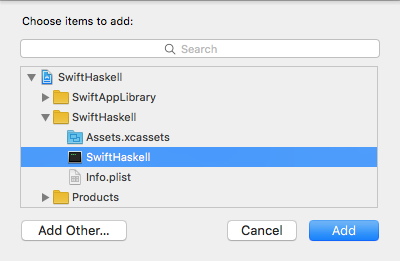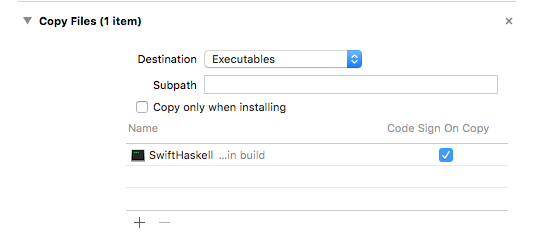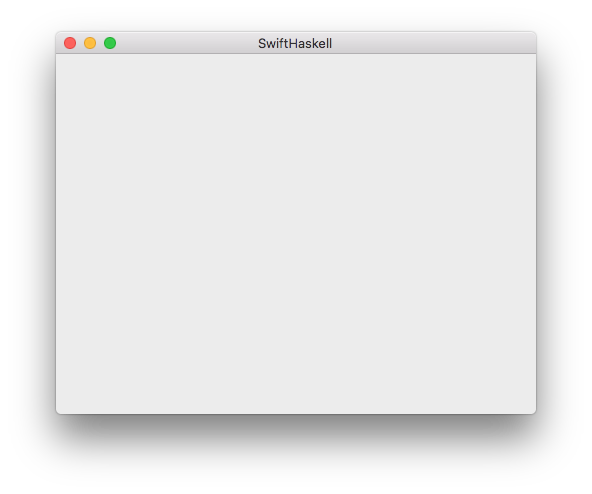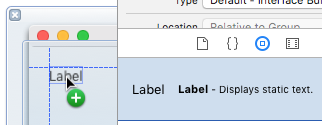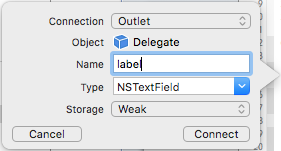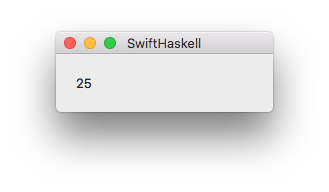nanotech / Swift Haskell Tutorial
Projects that are alternatives of or similar to Swift Haskell Tutorial
Integrating Haskell with Swift Mac Apps
In this tutorial, we'll create a Mac app using Swift and Xcode to build the UI, and Haskell to implement backend logic.
A basic familiarity with Haskell, Swift, Objective-C, C, Xcode, and shell scripting will be assumed.
Table of Contents
- Project Setup
- Exporting Haskell Functions
- Importing Haskell's Generated FFI Headers into Swift
- Converting the Swift App to a Framework
- Linking to the Framework
- Starting Cocoa
- Linking to the Executable
- Calling Haskell from Swift
- Passing Complex Data Types
- Troubleshooting
Project Setup
To start, create a new Cocoa Application Xcode project
with Swift as the default language.
Name the project SwiftHaskell.
cd into the directory with the .xcodeproj and create a new
stack project:
$ cd SwiftHaskell
$ stack new SwiftHaskellLibrary simple
Move these files up to the top directory, so we can run all of our commands from the same directory:
$ mv -vn SwiftHaskellLibrary/* .
$ rmdir SwiftHaskellLibrary
In SwiftHaskellLibrary.cabal, rename the executable to
match the Xcode app's name of SwiftHaskell:
executable SwiftHaskell
To combine our Haskell library with our Swift UI, we'll build the Swift app as a framework and link to it from the Haskell executable. Xcode will then package both up into an app bundle.
The reason for doing the linking in this direction is that building a self-contained dynamic library is currently simpler with Swift and Xcode than it is with Cabal.
Exporting Haskell Functions
Here's the trivial function square that we'll export as a
simple first example:
square x = x * x
Haskell functions exported via the FFI can only contain certain types in their signatures that are compatible with C: primitive integers, floats and doubles, and pointer types. The full list is in section 8.7 of the Haskell Report.
Since we'll only be using square to demonstrate the FFI, let's
assign it a FFI-compatible type directly. For more complex
functions, wrap them in a new function and convert their inputs
and outputs as needed.
import Foreign.C
square :: CInt -> CInt
square x = x * x
To export square, add a foreign export definition with a
calling convention of ccall:
foreign export ccall square :: CInt -> CInt
For the full syntax of foreign export, see section 8.3 of the
Haskell Report.
Together, src/Main.hs is
module Main where
import Foreign.C
foreign export ccall square :: CInt -> CInt
square :: CInt -> CInt
square x = x * x
main :: IO ()
main = do
putStrLn "hello world"
Importing Haskell's Generated FFI Headers into Swift
If we now stack build, in addition to building the library,
GHC will generate C header files for each module with foreign
exports. Because these are build artifacts, they're buried
somewhat deep in the file hierarchy, but we can ask stack
and find where they are:
$ find "$(stack path --dist-dir)" -name Main_stub.h
.stack-work/dist/x86_64-osx/Cabal-1.24.0.0/build/SwiftHaskellLibrary/SwiftHaskellLibrary-tmp/Main_stub.h
These stub headers #include "HsFFI.h" from GHC, so we'll also
need to find the current compiler's version of that header.
$ find "$(stack path --compiler-bin)/.." -name HsFFI.h
/Users/nanotech/.stack/programs/x86_64-osx/ghc-8.0.1/bin/../lib/ghc-8.0.1/include/HsFFI.h
Since we'll be importing these headers into a Swift framework,
we won't be able to use #include as we would in C. Instead,
Swift uses Clang's module format. (Swift
applications can use bridging headers,
but frameworks must use modules.) A
module.modulemap file to import Main_stub.h looks like
module SwiftHaskell {
header "Main_stub.h"
export *
}
As the paths to these headers vary, let's use a script to automatically copy them out and build a module map. We'll also create a symlink to the built executable's location for later.
#!/usr/bin/env bash
set -eu
# Change EXECUTABLE_NAME to the name of your Haskell executable.
EXECUTABLE_NAME=SwiftHaskell
DIST_DIR="$(stack path --dist-dir)"
GHC_VERSION="$(stack exec -- ghc --numeric-version)"
GHC_LIB_DIR="$(stack path --compiler-bin)/../lib/ghc-$GHC_VERSION"
STUB_BUILD_DIR="${DIST_DIR}/build/${EXECUTABLE_NAME}/${EXECUTABLE_NAME}-tmp"
STUB_MODULE_DIR="${EXECUTABLE_NAME}/include"
STUB_MODULE_MAP="${STUB_MODULE_DIR}/module.modulemap"
# Create a module map from the generated Haskell
# FFI export headers for importing into Swift.
mkdir -p "${STUB_MODULE_DIR}"
NL="
"
module_map="module ${EXECUTABLE_NAME} {${NL}"
for h in $(find "${STUB_BUILD_DIR}" -name '*.h'); do
h_filename="${h/$STUB_BUILD_DIR\//}"
cp "$h" "${STUB_MODULE_DIR}/"
module_map="${module_map} header \"${h_filename}\"${NL}"
done
module_map="${module_map} export *${NL}"
module_map="${module_map}}"
echo "${module_map}" > "${STUB_MODULE_MAP}"
# Symlink to the current GHC's header directory so we can add it
# to Xcode's include path as $(PROJECT_DIR)/build/ghc/include.
mkdir -p build/ghc
ln -sf "${GHC_LIB_DIR}/include" build/ghc/
# Symlink to the Haskell executable so we can easily drag it
# into Xcode to use as the executable for the app bundle.
ln -sf "../${DIST_DIR}/build/${EXECUTABLE_NAME}/${EXECUTABLE_NAME}" build/
Change the value of the EXECUTABLE_NAME variable to the
name of the executable in your .cabal file if you named it
something other than SwiftHaskell.
Save the script as link-deps.sh, run stack build, and then
run bash link-deps.sh to prepare for the next section.
Running the script will create
SwiftHaskell/include/module.modulemap and two symlinks in
the project's build/ directory:
-
SwiftHaskell-> ../.stack-work/dist/{arch}/Cabal-{version}/build/SwiftHaskell/SwiftHaskell -
ghc-
include-> ~/.stack/programs/{arch}/ghc-{version}/bin/../lib/ghc-{version}/include
-
Text marked as {} will vary.
Converting the Swift App to a Framework
Create a new Cocoa Framework target in the Xcode project,
with Swift as the default language.
Name the framework SwiftAppLibrary.
Framework Configuration
To move over our application code and UI, change the Target
Membership of AppDelegate.swift and MainMenu.xib in Xcode's
File Inspector in the right sidebar so that they are only
included in SwiftAppLibrary:
In AppDelegate.swift, remove the @NSApplicationMain
attribute from the AppDelegate class, as we don't want an
auto-generated main function in our framework. We will
implement an equivalent way to start Cocoa later, to be called
from the Haskell executable's main.
Xcode will place the built framework in a temporary directory
(~/Library/Developer/Xcode/DerivedData/) with an unpredictable
subpath. So that Cabal will be able to find the framework for
linking, add a new Run Script build phase
that creates a symlink to the built framework in build/:
set -u
ln -sf "${BUILT_PRODUCTS_DIR}/${FULL_PRODUCT_NAME}" "${PROJECT_DIR}/build/"
App Bundle Configuration
Drag the SwiftHaskell executable we built previously with
Stack into Xcode from the build/ directory that we symlinked
it into,
but do not add it to any targets when prompted:
When Xcode creates Swift frameworks, it expects that the application that links the framework will include the Swift standard libraries. Xcode automatically adds these libraries to Swift applications. Since our application executable is built with Haskell and not Swift, we'll need to explicitly tell Xcode to include the Swift standard libraries in our application.
In the app target's Build Settings tab, set Always Embed Swift Standard Libraries to Yes:
In the app target's Build Phases, remove the Compile Sources and Link Binary With Libraries phases. We are using Stack to build the app's executable instead of Xcode.
Add a new Copy Files phase that copies the SwiftHaskell
executable into the app bundle's Executables directory:
Build the SwiftAppLibrary framework in Xcode to prepare for the next sections.
Linking to the Framework
Add these options to the executable's section in the .cabal
file:
executable SwiftHaskell
ghc-options: -threaded -framework-path build
ld-options: -rpath @executable_path/../Frameworks
frameworks: SwiftAppLibrary
-
-threadedenables the multithreaded GHC runtime, which is usually what you want. -
-framework-path buildtells GHC to look for frameworks where we symlinked our framework to. -
-rpath @executable_path/../Frameworksembeds into the executable where the dynamic linker should look for shared libraries.
See the Flag Reference in the GHC Users'
Guide and man 1 ld for more details.
Starting Cocoa
Because Haskell has control over the program's entry point
(main), we'll need to have it call out to Cocoa to start its
main thread. In SwiftAppLibrary.h, declare a new function
named runNSApplication and mark it as FOUNDATION_EXPORT to
indicate that it should be exported from the framework:
FOUNDATION_EXPORT void runNSApplication(void);
Implement the function by adding a new Objective-C .m file to
the framework target containing
#import "SwiftAppLibrary.h"
@interface AClassInThisFramework : NSObject @end
@implementation AClassInThisFramework @end
void runNSApplication(void) {
NSApplication *app = [NSApplication sharedApplication];
NSBundle *bundle = [NSBundle bundleForClass:[AClassInThisFramework class]];
NSArray *topObjects;
[[[NSNib alloc] initWithNibNamed:@"MainMenu" bundle:bundle]
instantiateWithOwner:app topLevelObjects:&topObjects];
[app run];
}
This is possible to write in Swift, however as of Swift 3.0.2,
the annotation to export unmangled C symbols (@_cdecl) is not
documented as stable. Additionally, whole module optimization
will assume that @_cdecl symbols are unused and remove them.
In Main.hs, import the foreign function and call it from
the end of main:
module Main where
import Foreign.C
foreign export ccall square :: CInt -> CInt
square :: CInt -> CInt
square x = x * x
foreign import ccall "runNSApplication" runNSApplication :: IO ()
main :: IO ()
main = do
putStrLn "hello world"
runNSApplication
runNSApplication will not return, being busy with Cocoa's
main run loop. Use Control.Concurrent.forkIO before calling
runNSApplication to run other tasks as needed.
Build the SwiftHaskellLibrary framework in Xcode, then stack build, and then finally build and run the SwiftHaskell
app target to launch the app and see the default window from
MainMenu.xib:
Linking to the Executable
To tell Xcode where to find our module.modulemap, add
$(PROJECT_DIR)/SwiftHaskell/include to the framework target's
Swift Compiler - Search Paths, Import Paths setting in
Xcode,
and, for the GHC headers the module depends on, add
$(PROJECT_DIR)/build/ghc/include to the framework's User
Header Search Paths setting:
In order for the framework to be able to link to symbols in the Haskell executable, we need to tell the linker to leave symbols undefined and have them be resolved at runtime.
Add -undefined dynamic_lookup to the framework's
Other Linker Flags setting.
Be aware that this means that link errors will occur at runtime instead of at link time. Also note that the framework linking to symbols in the executable (and depending on the generated headers), and the executable linking to the framework, creates a circular dependency. When building the project clean, you will need to build the components in this order:
-
stack buildto generate the Haskell FFI export headers. Linking will fail, as the Swift framework is not built yet. - Build the Swift framework.
stack build- Build the app bundle.
The first step can be skipped subsequently by committing the generated headers to source control.
To help automate this, add a new Run Script build phase to the beginning of the framework's build phases with the contents
stack build
bash link-deps.sh
Add the Haskell sources as input files:
$(PROJECT_DIR)/src/Main.hs
$(PROJECT_DIR)/SwiftHaskellLibrary.cabal
$(PROJECT_DIR)/stack.yaml
And the executable as an output file:
$(PROJECT_DIR)/build/SwiftHaskell
Or, if you prefer building primarily with stack build, set the
build-type in your .cabal to Custom and add a postBuild
hook to Setup.hs:
import Distribution.Simple
import System.Process
main = defaultMainWithHooks $ simpleUserHooks
{ postBuild = \args buildFlags pkgDesc localBuildInfo -> do
callProcess "bash" ["link-deps.sh"]
callProcess "xcodebuild" ["-target", "SwiftHaskell"]
}
Calling Haskell from Swift
We're now ready to use exported Haskell functions from Swift.
Import the module we defined in our module.modulemap,
SwiftHaskell, at the top of AppDelegate.swift:
import SwiftHaskell
Let's add a new label to the window for us to write the result
of our Haskell function square into. Open MainMenu.xib and
select the window object in the left sidebar to bring it into
view. Then drag in a label from the object library in the right
sidebar into the window:
Now option-click on AppDelegate.swift in the file list to open
it in an assistant editor. Holding the control key, drag the
label from the window into the AppDelegate class to add and
connect a new @IBOutlet:
Adding the outlet will add a new property to the AppDelegate:
@IBOutlet weak var label: NSTextField!
With the SwiftHaskell module imported and a label connected,
let's call square and display its result in the label. Add
this to applicationDidFinishLaunching:
label.stringValue = "\(square(5))"
The final contents of AppDelegate.swift are:
import Cocoa
import SwiftHaskell
class AppDelegate: NSObject, NSApplicationDelegate {
@IBOutlet weak var window: NSWindow!
@IBOutlet weak var label: NSTextField!
func applicationDidFinishLaunching(_ aNotification: Notification) {
label.stringValue = "\(square(5))"
}
func applicationWillTerminate(_ aNotification: Notification) {
}
}
Running the app,
If the build fails with Use of unresolved identifier 'square',
perform a full clean with the Product » Clean Build Folder...
⌥⇧⌘K menu command and then rebuild. (Hold ⌥ option to reveal
the menu item.) This appears to be a bug with Xcode (version
8.2 as of writing) caching some intermediate state from before
the SwiftHaskell module was fully configured, and should not
occur in future builds.
Passing Complex Data Types
Bytes
[UInt8] to ByteString
Call withUnsafeBufferPointer on a Swift Array to get
an UnsafeBufferPointer, and then read its .baseAddress
property to get an UnsafePointer pass into the exported
Haskell function. The corresponding mutable variants are
withUnsafeMutableBufferPointer, UnsafeMutableBufferPointer,
and UnsafeMutablePointer.
The generated Haskell headers use a single pointer type for all
pointers, HsPtr (void *), which is mutable (not const). If
you know that a function does not mutate through a pointer, you
can use the HsPtr(mutating:) constructor to cast a non-mutable
pointer to a mutable pointer.
bytes.withUnsafeBufferPointer { bytesBufPtr in
someHaskellFunction(HsPtr(mutating: bytesBufPtr.baseAddress), bytesBufPtr.count)
}
If the function mutates the pointer's data, you must use
withUnsafeMutableBytes:
bytes.withUnsafeMutableBufferPointer { bytesBufPtr in
someHaskellFunction(bytesBufPtr.baseAddress, bytesBufPtr.count)
}
To bring an array of bytes into a Haskell ByteString, use
Data.ByteString.packCStringLen:
type CString = Ptr CChar
packCStringLen :: (CString, Int) -> IO ByteString
For example,
import Foreign.C
import Foreign.Ptr
import qualified Data.ByteString as B
import Data.Word
foreign export ccall countBytes :: Word8 -> Ptr CChar -> CSize -> IO CSize
countBytes :: Word8 -> Ptr CChar -> CSize -> IO CSize
countBytes needle haystack haystackLen = do
s <- B.packCStringLen (haystack, fromIntegral haystackLen)
pure (B.foldl (\count b -> count + if b == needle then 1 else 0) 0 s)
With a Swift wrapping function of
func count(byte: UInt8, in bytes: [UInt8]) -> Int {
var r = 0
bytes.withUnsafeBytes { bytesPtr in
r = Int(SwiftHaskell.countBytes(byte, HsPtr(mutating: bytesPtr.baseAddress)))
}
return r
}
ByteString to [UInt8]
To pass a ByteString to an exported Swift function that
accepts a pointer and a length, use useAsCStringLen:
import Data.ByteString (ByteString)
import qualified Data.ByteString as B
foreign import ccall "someSwiftFunction" someSwiftFunction :: Ptr CChar -> CSize -> IO ()
passByteString :: ByteString -> IO ()
passByteString s =
B.useAsCStringLen s $ \(p, n) ->
someSwiftFunction p (fromIntegral n)
To return the contents of a ByteString, call mallocArray to
allocate a new array with C's malloc allocator and copy the
ByteString data into it. The Swift caller is then responsible
for calling free on the pointer. Use Foreign.Storable.poke
to also return the size by writing into a passed pointer.
import Data.ByteString (ByteString)
import qualified Data.ByteString as B
import qualified Data.ByteString.Unsafe as BU
import Foreign.Storable (poke)
mallocCopyByteString :: ByteString -> IO (Ptr CChar, Int)
mallocCopyByteString s =
BU.unsafeUseAsCStringLen s $ \(p, n) -> do
a <- mallocArray n
copyArray a p n
pure (a, n)
foreign export ccall getSequence :: Ptr CSize -> IO (Ptr CChar)
getSequence :: Ptr CSize -> IO (Ptr CChar)
getSequence sizePtr = do
(p, n) <- mallocCopyByteString (B.pack [1..10])
poke sizePtr (fromIntegral n)
pure p
The imported getSequence function returns a
UnsafeMutableRawPointer in Swift. To copy the elements into
a Swift array, first assign a type to the memory using the
.assumingMemoryBound(to:) method. Then wrap the pointer
and length in an UnsafeBufferPointer and pass it to the
array constructor, which copies the elements into a new array
using the Collection protocol that UnsafeBufferPointer
implements.
func getSequence() -> [UInt8] {
var n = 0
let p = SwiftHaskell.getSequence(&n).assumingMemoryBound(to: UInt8.self)
let a = [UInt8](UnsafeBufferPointer(start: p, count: n))
free(p)
return a
}
Functions and Closures
Passing Swift Functions to Haskell
C function pointers have a type constructor of FunPtr in
Haskell. For example, FunPtr (CInt -> CSize -> IO ())
corresponds to void (*)(int, size_t).
To convert FunPtrs into callable Haskell functions, use a
foreign import ccall "dynamic" declaration to ask the compiler
to generate a conversion function for that function type:
foreign export ccall callbackExample :: FunPtr (CInt -> IO ()) -> IO ()
foreign import ccall "dynamic" unwrapCallback :: FunPtr (CInt -> IO ()) -> (CInt -> IO ())
callbackExample :: FunPtr (CInt -> IO ()) -> IO ()
callbackExample f = (unwrapCallback f) 3
If there is no context that needs to be captured, Swift
functions can be passed in almost directly. However, like
HsPtr, the generated headers only use a single function
pointer type, HsFunPtr (void (*)(void)), so a little casting
is usually necessary:
func callbackExample(f: (@convention(c) (CInt) -> Void)) {
let hsf: HsFunPtr = unsafeBitCast(f, to: HsFunPtr.self)
SwiftHaskell.callbackExample(hsf)
}
To pass Swift closures with context, we can use the traditional
void * context pointer solution. Passing context however
means that we need to keep it alive while the callback is held,
and release it when we're done with it. For that, we can use
Foreign.ForeignPtr.
We'll wrap the context with
type FinalizerPtr a = FunPtr (Ptr a -> IO ())
newForeignPtr :: FinalizerPtr a -> Ptr a -> IO (ForeignPtr a)
and then apply it to the function with
withForeignPtr :: ForeignPtr a -> (Ptr a -> IO b) -> IO b
Together we have:
import Control.Concurrent
import Foreign.C
import Foreign.ForeignPtr
import Foreign.Ptr
foreign export ccall contextCallbackExample
:: Ptr ()
-> FunPtr (Ptr () -> IO ())
-> FunPtr (Ptr () -> CInt -> IO ())
-> IO ()
foreign import ccall "dynamic" unwrapContextCallback
:: FunPtr (Ptr () -> CInt -> IO ())
-> (Ptr () -> CInt -> IO ())
contextCallbackExample
:: Ptr () -- ^ Context pointer
-> FunPtr (Ptr () -> IO ()) -- ^ Context release function
-> FunPtr (Ptr () -> CInt -> IO ()) -- ^ Callback function
-> IO ()
contextCallbackExample ctxp releaseCtx callbackPtr = do
ctxfp <- newForeignPtr releaseCtx ctxp
let callback :: CInt -> IO ()
callback result = withForeignPtr ctxfp $ \ctxp' ->
(unwrapContextCallback callbackPtr) ctxp' result
_ <- forkIO $ do
let result = 3 -- perform your complex computation here
callback result
pure ()
The context pointer that we pass from the Swift side will be an object containing the closure itself. The function passed as the function pointer will merely cast the object to the known closure type and call it.
To convert our Swift closure into a raw pointer, we'll use
Swift's Unmanaged wrapper type. These are the methods we'll
use from it:
public struct Unmanaged<Instance : AnyObject> {
public static func passRetained(_ value: Instance) -> Unmanaged<Instance>
public func toOpaque() -> UnsafeMutableRawPointer
public static func fromOpaque(_ value: UnsafeRawPointer) -> Unmanaged<Instance>
public func takeUnretainedValue() -> Instance
public func takeRetainedValue() -> Instance
}
Since Swift functions do not implement the AnyObject protocol
(they are not class types), we'll need to wrap them in a object
first.
Additionally, referring directly to a Swift function name will
give a Swift function type, which is not bit-compatible with a C
function type. Before casting to HsFunPtr, we'll need to use a
safe as cast to a @convention(c) type.
func contextCallbackExample(f: ((CInt) -> Void)) {
class Wrap<T> {
var inner: T
init(_ inner: T) {
self.inner = inner
}
}
func release(context: HsPtr) {
let _: Wrap<(CInt) -> Void> = Unmanaged.fromOpaque(context).takeRetainedValue()
}
func call(context: HsPtr, value: CInt) {
let wf: Wrap<(CInt) -> Void> = Unmanaged.fromOpaque(context).takeUnretainedValue()
let f = wf.inner
f(value)
}
let release_hs = unsafeBitCast(
release as @convention(c) (HsPtr) -> Void, to: HsFunPtr.self)
let call_hs = unsafeBitCast(
call as @convention(c) (HsPtr, CInt) -> Void, to: HsFunPtr.self)
let ctx = Unmanaged.passRetained(Wrap(f)).toOpaque()
SwiftHaskell.contextCallbackExample(ctx, release_hs, call_hs)
}
Passing Haskell Functions to Swift
In addition to the static foreign export, we can export
dynamically created Haskell functions with foreign export "wrapper". Unlike when passing Swift closures, a separate
context pointer is not needed as the Haskell runtime supplies a
distinct function pointer address for each wrapped function.
import Foreign.C
import Foreign.Ptr
foreign export ccall makeMultiplier :: CInt -> IO (FunPtr (CInt -> CInt))
foreign import ccall "wrapper" wrapMultiplier
:: (CInt -> CInt)
-> IO (FunPtr (CInt -> CInt))
makeMultiplier :: CInt -> IO (FunPtr (CInt -> CInt))
makeMultiplier x = wrapMultiplier (x *)
To free the FunPtr, export Foreign.Ptr.freeHaskellFunPtr and
call it from Swift when you're done with the function.
foreign export ccall freeMultiplier :: FunPtr (CInt -> CInt) -> IO ()
freeMultiplier :: FunPtr (CInt -> CInt) -> IO ()
freeMultiplier = freeHaskellFunPtr
Wrap the Haskell function in a Swift class to manage its lifetime:
class Multiplier {
let funPtr: HsFunPtr
init(_ x: CInt) {
self.funPtr = SwiftHaskell.makeMultiplier(x)
}
func multiply(_ y: CInt) -> CInt {
typealias F = @convention(c) (CInt) -> CInt
let f = unsafeBitCast(self.funPtr, to: F.self)
return f(y)
}
deinit {
SwiftHaskell.freeMultiplier(self.funPtr)
}
}
Troubleshooting
stack build fails with ld: framework not found SwiftHaskellLibrary
Build the SwiftHaskellLibrary framework in Xcode before running
stack build.
See the discussion about circular dependencies in the Linking
to the Executable section. If this still fails, ensure that
link-deps.sh is being run before the framework is built as
described at the end of Linking to the Executable. Also check
that the build/ directory contains all three symlinks:
-
SwiftAppLibrary.framework-> ~/Library/Developer/Xcode/DerivedData/SwiftHaskell-{hash}/Build/Products/{Debug,Release}/SwiftAppLibrary.framework -
SwiftHaskell-> ../.stack-work/dist/{arch}/Cabal-{version}/build/SwiftHaskell/SwiftHaskell -
ghc-
include-> ~/.stack/programs/{arch}/ghc-{version}/bin/../lib/ghc-{version}/include
-
Building in Xcode fails with PBXCp ...build/SwiftHaskell/SwiftHaskell: No such file or directory
Build the Haskell executable with stack build.
Some Target Membership checkboxes are disabled in Xcode
Add a Compile Sources or Copy Bundle Resources phase, as appropriate for the file you're modifying, to the target with the disabled checkbox.
Building in Xcode fails with Unable to run command ... - this target might include its own product.
Ensure that the Copy Files phase for the executable is copying the executable, and not the app bundle (the product). See the App Bundle Configuration section.
Running the app fails with dyld: Library not loaded: @rpath/libswiftAppKit.dylib
Ensure that Always Embed Swift Standard Libraries is set to Yes on the app target, as described in App Bundle Configuration.
Building in Xcode fails with Use of unresolved identifier 'square'
If the module is certainly imported, this is probably from Xcode
incorrectly retaining an expired cache for the SwiftHaskell
module. Perform a full clean with the Product » Clean Build
Folder... ⌥⇧⌘K menu command and then rebuild. (Hold ⌥ option to
reveal the menu item.)








